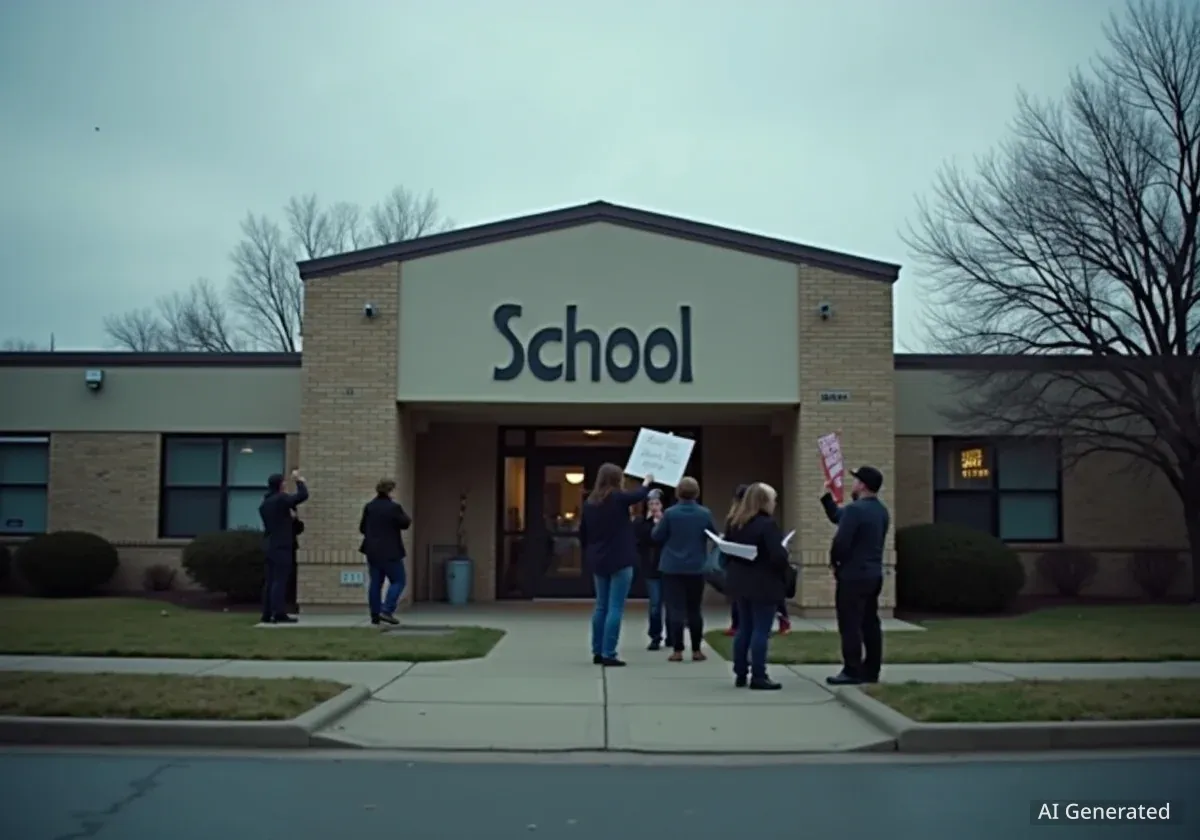Highlander Charter School’s elementary campus in Providence will be closed on Monday and Tuesday due to a planned strike by more than two dozen staff members. The decision to close was made by school leadership after receiving notice of the strike, which they have described as unlawful.
The labor dispute centers on demands for improved wages and benefits, with union representatives stating that current compensation is driving experienced educators away from the school. The strike is scheduled to begin at 7:30 a.m. on Monday, affecting students and families at the elementary campus, while the school's secondary campus in Warren will remain open.
Key Takeaways
- Highlander Charter School's elementary campus in Providence will be closed Monday and Tuesday due to a staff strike.
- The dispute involves wages and a new, more expensive health plan that teachers say is causing high turnover.
- The union, IBEW Local 2323, is seeking parity with nearby schools, citing a nearly $10,000 wage gap.
- The Rhode Island Department of Education has stated the strike is prohibited under state law, a claim the union disputes under federal labor rights.
Contract Negotiations Stall Over Pay and Benefits
The core of the conflict lies in stalled contract negotiations between the school's administration and its staff, who are represented by the International Brotherhood of Electrical Workers (IBEW) Local 2323. Staff members, including certified teachers, teaching assistants, and IT professionals, are demanding better compensation.
Megan Sullivan, a fourth-grade teacher who has been with the school for seven years, explained that the staff felt they had no other option. "We're not asking for a lot at all. We're asking for parity with schools that are down the road from us," she said. Sullivan noted that a recently implemented, more costly health plan has exacerbated financial pressures on employees.
Teacher Turnover
According to Sullivan, the financial instability has led to significant staff turnover. "We've had 10 teachers leave just this year," she stated, adding that departing colleagues often express their love for the school but cannot afford to stay.
The union argues that its proposal is reasonable. Eddie Blackburn, the assistant business manager for IBEW Local 2323, said the requested changes would increase the school's annual operating costs by approximately $400,000. He contrasted this with what he claims the school has already spent on legal services.
"Just to give you an example of where their priorities are, they've already spent $265,000 on an anti-union law firm," Blackburn said. "We have very modest, minimal goals with this contract."
A Dispute Over Funding and Priorities
A key point of contention is the wage disparity between Highlander and other local charter schools. Blackburn pointed to the Paul Cuffee School as a comparable institution operating under the same state funding formula.
He stated that Highlander's best offer would still leave its teachers earning about $10,000 less per year than their counterparts at Paul Cuffee. "If the Paul Cuffee school can go ahead and afford it using the same funding formula, one has to ask, 'why can't Highlander?'" Blackburn questioned.
The Broader Context
Charter schools in Rhode Island are publicly funded but operate independently of traditional public school districts. This autonomy allows for different management structures and, in some cases, different pay scales and benefit packages for staff, leading to disparities within the public education sector.
The union's position is that the school's administration is prioritizing spending on consultants and legal fees over retaining its teaching staff. This claim highlights a fundamental disagreement over how the school's budget should be allocated.
School Leadership and State Officials Respond
Highlander's administration has condemned the decision to strike, framing it as a harmful disruption for students and families. Superintendent Simona Simpson-Thomas emphasized the impact on the school community.
“This is an unnecessary and irresponsible disruption for our students and families," Simpson-Thomas said in a statement. "This signals to our families that politics and outside union interests are more important than the education of our students and the success of our school.”
She added that the administration is ready to return to negotiations but must close the elementary campus due to a lack of safe staffing levels. The well-being and stability of students, she said, should be the central focus.
The Rhode Island Department of Education (RIDE) has also weighed in on the matter. In a letter sent to the union, RIDE asserted that the strike is illegal under state law.
"Under Rhode Island law, which safeguards the rights and well-being of children, Highlander Charter School - and all charter schools - are public schools. As such, their teaching personnel are prohibited from engaging in a strike," a RIDE spokesperson wrote. The department urged all parties to find a resolution that prioritizes student learning.
Conflicting Views on Legality of Strike
The legality of the strike itself is a major point of disagreement. While RIDE cites state law prohibiting strikes by public school employees, the union claims protection under federal law.
When asked about the state's position, IBEW's Eddie Blackburn was firm. "No. We believe we're on firm legal ground," he stated. "We enjoy federal rights under the National Labor Relations Act. They are protected. We are covered."
This legal conflict between state and federal regulations adds another layer of complexity to the dispute. As teachers prepare to picket on Monday morning, the immediate future for Highlander's elementary students remains uncertain, with classes canceled for at least two days and no clear timeline for a resolution.





